Physical Address
304 North Cardinal St.
Dorchester Center, MA 02124
Physical Address
304 North Cardinal St.
Dorchester Center, MA 02124

Discover the hidden camping secrets that keep mosquitoes away before they detect you from 50 feet away.
You’d be surprised to learn that mosquitoes can detect your breath from 50 feet away, making you a walking target even before you’ve unpacked your gear. While most campers focus on spraying themselves with repellent, they’re missing vital strategies that could eliminate bugs before they become a problem. The difference between a miserable, bite-covered trip and a comfortable outdoor experience often comes down to decisions you make hours before the first mosquito even finds you.
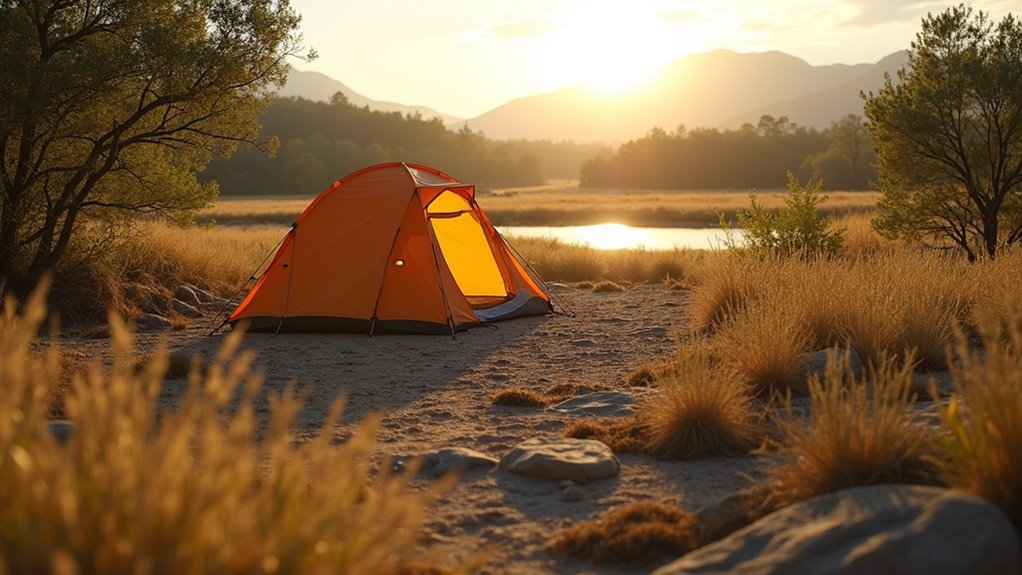
When you’re scouting for the perfect campsite, you’ll want to avoid areas where bugs naturally congregate. Skip spots near stagnant water like ponds, marshes, or slow-moving streams where mosquitoes breed. Don’t camp in tall grass or dense vegetation where ticks and chiggers hide.
Steer clear of stagnant water, marshes, and thick vegetation when choosing your campsite to minimize encounters with mosquitoes, ticks, and chiggers.
Choose elevated locations with good airflow – bugs struggle in breezy conditions. Rocky or sandy areas work better than lush, damp ground. If you’re camping near water, pick flowing streams over still lakes.
Look for sites with natural wind barriers like hills or clearings that channel air movement. Avoid camping directly under dense tree canopies where air circulation’s poor. Check for nearby animal trails, as these attract biting flies.
Open meadows with gentle slopes often provide the best combination of drainage and airflow. For the ultimate bug-free camping experience, consider high-altitude destinations like glacier climbing trails where cold temperatures and harsh conditions naturally deter most insects.
Even with the perfect campsite selected, you’ll need reliable bug repellent as your next line of defense. DEET-based repellents offer the strongest protection against mosquitoes, ticks, and flies. Choose products with 20-30% DEET concentration for effective, long-lasting coverage without skin irritation.
Apply repellent to exposed skin and clothing, but avoid your face, hands, and cuts. Spray into your palms first, then rub onto facial areas, staying clear of eyes and mouth. Reapply every 4-6 hours or after swimming and sweating.
For natural alternatives, consider picaridin-based products or essential oil blends containing citronella and eucalyptus. These work well for shorter trips but require more frequent application.
Always pack extra repellent—you’ll use more than expected during multi-day camping adventures. If you’re planning a fishing trip as part of your camping adventure, consider whether renting or buying a boat makes the most sense for your budget and frequency of use.
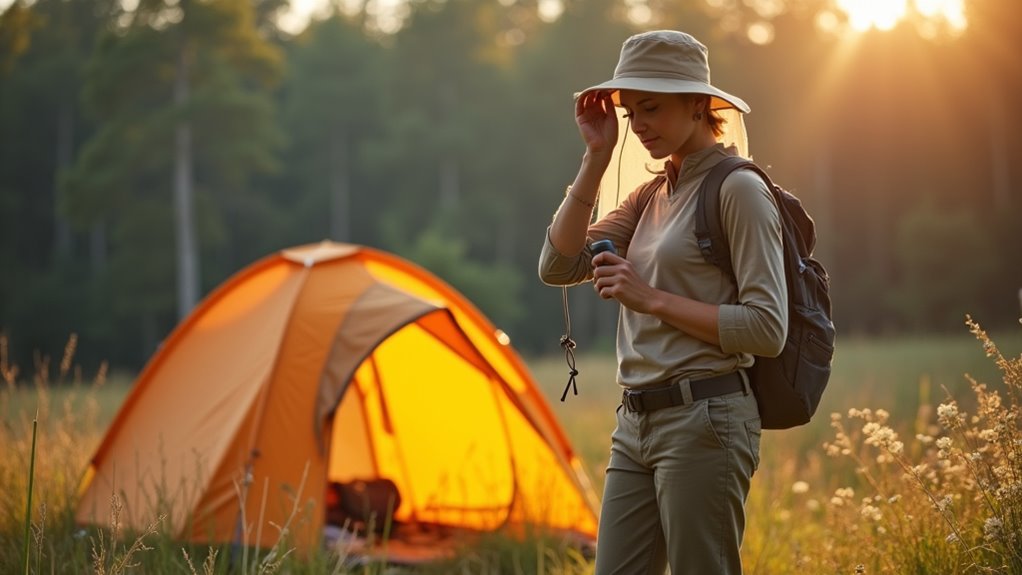
While repellent protects exposed skin, your clothing choices create the foundation of your bug defense strategy. Long-sleeved shirts and pants eliminate access points where mosquitoes and ticks can reach you. Choose lightweight, tightly-woven fabrics that bugs can’t penetrate while keeping you cool.
Your gear selection makes a significant difference:
The right protective gear transforms your outdoor experience from a constant battle against biting insects into comfortable adventure.
Proper layering techniques become especially important during cold-weather camping when you need bug protection without compromising warmth and comfort.
Beyond what you wear, the way you organize your campsite creates defensive zones that keep bugs at bay. Start by selecting elevated, breezy spots where natural air circulation discourages insects from settling. Clear away standing water sources like puddles or containers where mosquitoes breed.
Set up your tent’s rainfly even in clear weather—it creates an extra barrier between you and flying insects. Position camp chairs and cooking areas away from dense vegetation where bugs congregate.
Create a perimeter using citronella torches or lanterns, forming a protective ring around your main activity zone.
Consider portable screens for cooking and dining areas. These lightweight mesh panels block insects while maintaining airflow.
If you’re planning to incorporate rock climbing activities into your camping trip, establish your gear staging area in the windiest part of your campsite to minimize insect interference while sorting equipment.
Smart campsite layout becomes your first line of defense against unwanted buzzing visitors.
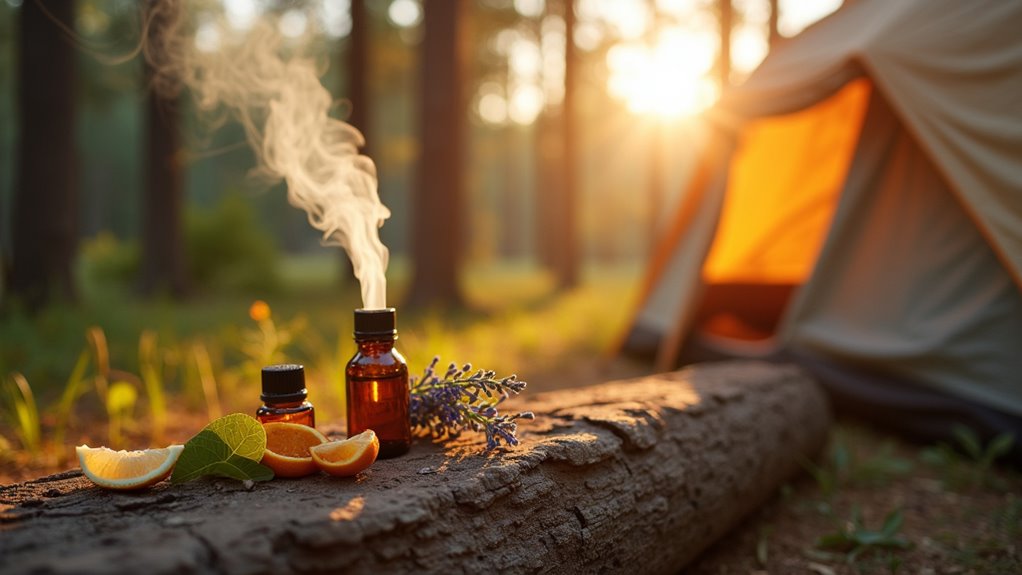
When commercial repellents aren’t available or you prefer natural alternatives, your kitchen and garden likely contain powerful bug-fighting ingredients. These DIY solutions work effectively while keeping harsh chemicals away from your skin and campsite.
Essential oils like peppermint, eucalyptus, and citronella create potent sprays when mixed with water. You’ll need about 10-15 drops per ounce of water in a spray bottle. Coffee grounds scattered around your tent perimeter deter ants and other crawling insects.
Here are three proven natural deterrent methods:
During winter camping adventures, these natural repellent methods become even more valuable since cold weather reduces bug activity but doesn’t eliminate the need for protection entirely.
Your food storage and eating habits directly determine how many bugs you’ll battle during your camping trip. Sweet drinks, sugary snacks, and open containers create insect magnets that’ll draw flies, wasps, and ants straight to your campsite.
Your campsite’s bug population depends entirely on how well you manage food storage and prevent creating insect feeding stations.
Store all food in sealed containers or coolers immediately after use. Don’t leave dirty dishes sitting around – wash them right away or at least rinse off food residue. Keep your cooking area clean by wiping down surfaces and disposing of scraps properly.
Water attracts mosquitoes for breeding, so empty any containers that collect standing water like buckets, cups, or tarps. Choose your water storage wisely – covered containers prevent both contamination and insect attraction.
When eating, cover food between servings and clean up spills immediately to avoid creating feeding stations for unwanted visitors. Proper food storage techniques also help maintain food safety and prevent spoilage in outdoor conditions where refrigeration isn’t available.
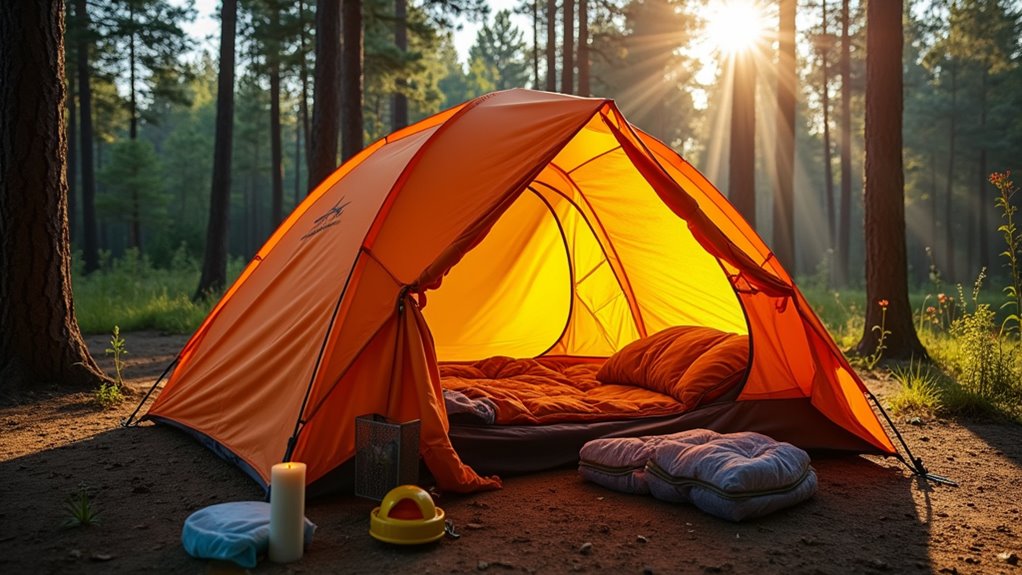
Since mosquitoes and other biting insects become most active during dawn and dusk hours, you’ll need rock-solid tent defenses to guarantee peaceful sleep. Your tent’s your sanctuary, so don’t compromise on protection.
Choose a campsite away from stagnant water sources where insects breed. Set up on higher ground with decent airflow to discourage bugs from lingering. Always inspect your tent for holes before departing home.
Essential sleep protection strategies:
For winter camping enthusiasts, building a snow cave provides natural insulation and complete protection from flying insects that can’t survive in freezing temperatures.
Why do some campers get eaten alive while others barely get a single bite? The answer lies in understanding what you’re dealing with. Mosquitoes hunt during dawn and dusk, drawn to carbon dioxide and body heat. They’re your primary concern near water sources.
Ticks lurk in tall grass and brush, latching onto you as you pass by. Check yourself thoroughly after hiking.
Black flies swarm during daylight hours and love moving water areas.
No-see-ums are tiny but vicious biters that slip through regular screens.
Chiggers hide in vegetation and cause intense itching days later.
Each insect requires different tactics. Know their habits, peak activity times, and preferred habitats. This knowledge lets you adjust your protection strategy accordingly rather than using one-size-fits-all approaches. Implementing smart tips for bug prevention can make the difference between a miserable trip and an enjoyable outdoor adventure.
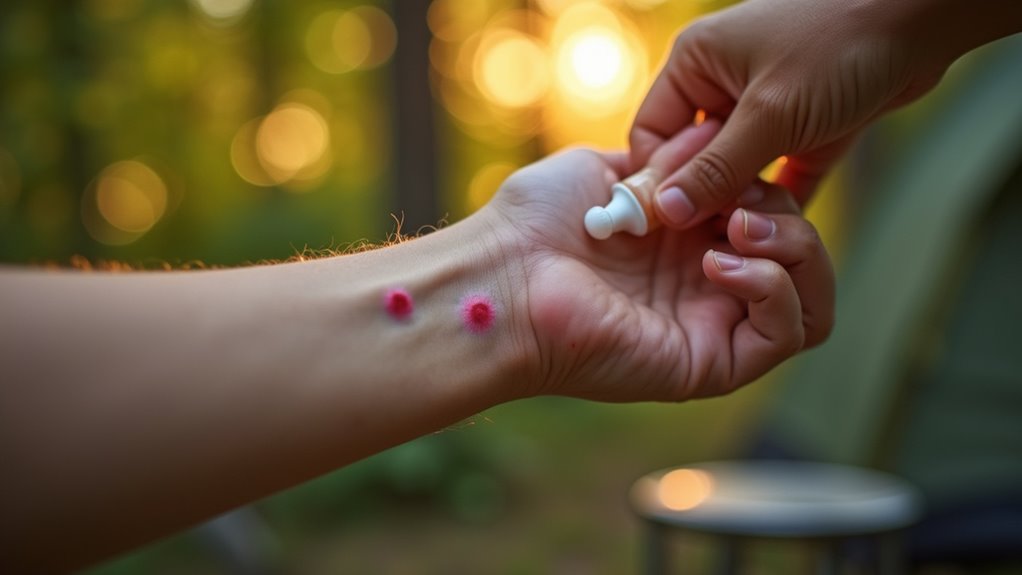
Even with the best prevention tactics, you’ll likely face a few bites during your camping trip. Quick treatment prevents itching from ruining your outdoor adventure and reduces infection risk.
Clean bites immediately with soap and water, then apply antiseptic. Ice reduces swelling and numbs pain. Avoid scratching—it’ll make everything worse and can introduce bacteria.
Essential bite treatment steps:
Keep fingernails short and consider antihistamines for severe reactions. Proper bite care is one of the common mistakes that new campers often overlook when preparing for their outdoor adventures.
You’ve built your fortress against nature’s tiny warriors. Your campsite becomes a sanctuary where DEET stands guard like a loyal sentry, while your mesh tent transforms into an impenetrable castle. The citronella candles flicker like beacons of protection, and your long sleeves become armor against the buzzing battalion. With these weapons in your arsenal, you’ll sleep soundly under the stars, victorious in the battle against unwanted visitors who’d turn your adventure into an itchy nightmare.